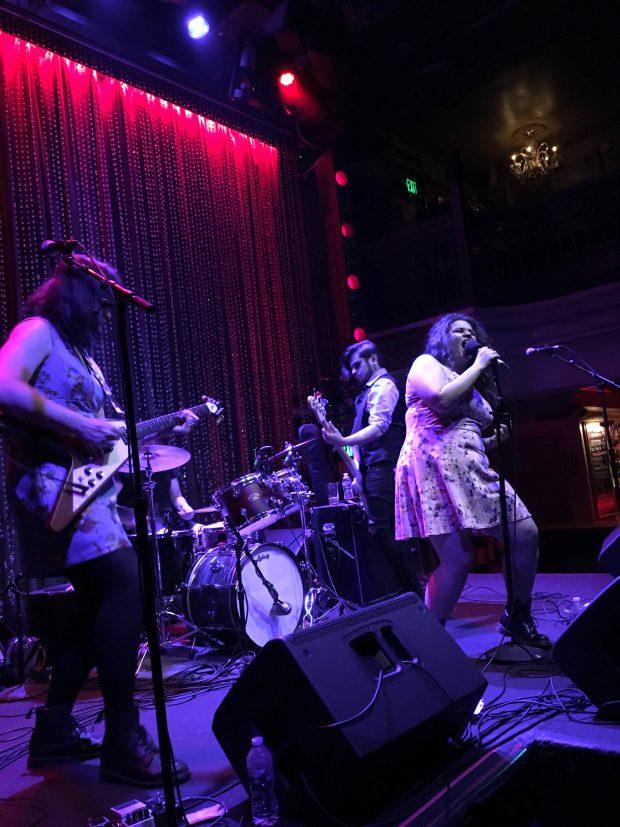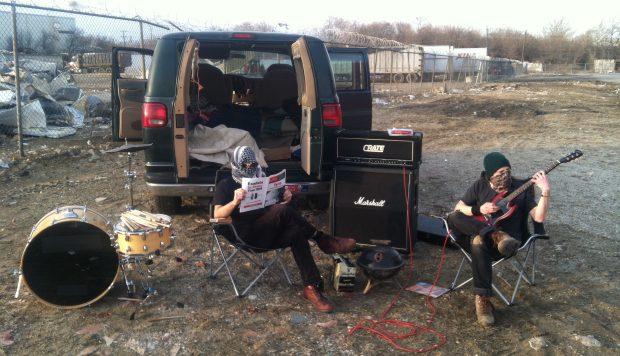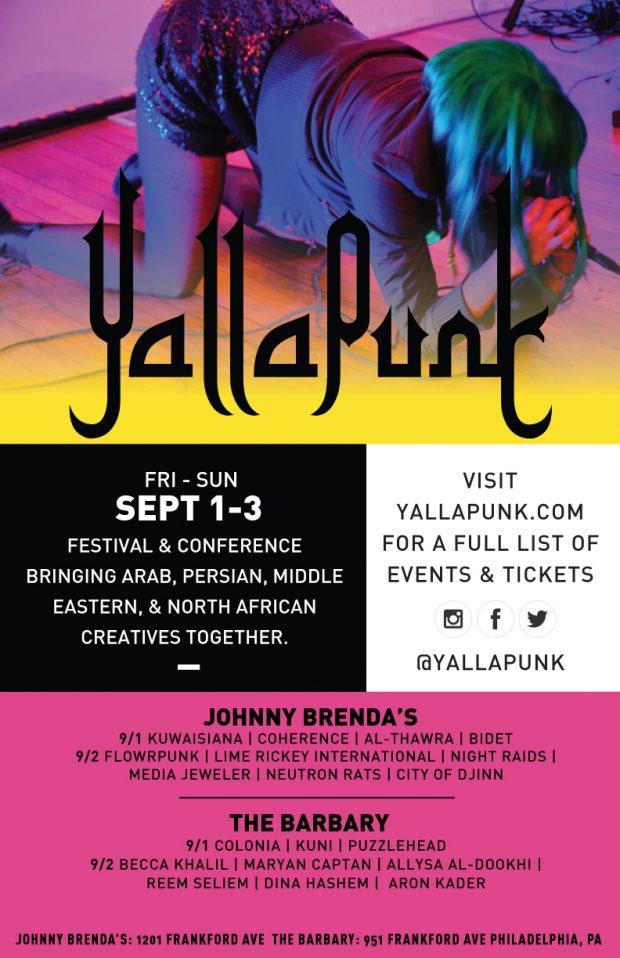Yalla Habibi! Philadelphia’s first ever Middle Eastern punk festival, YallaPunk, starts tonight

“YallaPunk is a direct response to negative depictions of populations of Middle Eastern and North African descent in mainstream media. This event is meant to highlight creative accomplishments of MENA individuals and serve as a safe space forum for discourse about social issues. The idea is to celebrate music, art, film and other cultural artifacts created by this particular population in an intersectional and inclusive space free from sexism, Islamophobia, transphobia, homophobia, and bigotry.” – From YallaPunk.com
Even though this is the inaugural YallaPunk, the Middle Eastern and North African (MENA) punk festival happening this weekend at various venues including Johnny Brenda’s and The Barbary, its roots stretch back more than 16 years to Blacksburg, Virginia. Festival organizer Rana Fayez grew up there, a young Arab-American immigrant trying to adjust to a new country. She had been in the United States for just a year when September 11th happened and everything changed.
After a particularly bad altercation with some older classmates who accused her of being complicit with the attacks, “… I thought ever since that people think I’m violent now, people think I’m not a good person. I felt very separated from my peers. I felt very isolated.” She soon found a home in her local punk scene. As she explained, “[Punk] gave me the guts to say: ‘I am who I want to be, not who you tell me to be.’”
Punk wasn’t just loud, angry music and a feeling of rebellion, though that was all very important. According to Fayez, “It was liberating. It was free. Punk rock shows were a sanctuary for me because I could exist [there] and a lot of my friends really accepted me.”
She started going to shows when she was a young teenager and soon after that was helping book bands in basements and local halls. Still, she always felt like something was missing. It’s not that she felt excluded, like she couldn’t participate due to the color of her skin or her ethnic background. It was more, as she put it: “Going into the punk scene it was a lot of cis white boys and you feel like you’re really into this scene, you love the music, you love the culture behind it, but you feel like you have to suppress certain things about your own culture to fit in. And it’s not fair.”
Fayez continued booking shows – including a large festival at Virginia Tech after the shooting there in 2007 – and eventually ended up in Philadelphia, where she’s become a sought-after DJ. If the seeds for YallaPunk were planted in a basement show in Blacksburg, the idea truly started germinating after a negative interaction Fayez had with a local promoter who used Arabic letters – randomly, spelling out nothing but gibberish – on a flyer promoting a show with no performers from Middle East or North African backgrounds on it.

Giant Kitty onstage at Johnny Brenda’s | photo by John Vettese for WXPN
According to Fayez, “I got so pissed and I just started talking to people on the internet and collected all these band names [of groups with Middle Eastern members].” She told the promoter, “I don’t trust you to not appropriate this. We have enough to throw a fest, so we’re going to do it.” One of the people Fayez connected with was Miriam Hakim, singer of Houston band Giant Kitty and a Syrian-American. Hakim had previously helped organize We Belong, a concert fundraiser in Houston of bands with Muslim members that was conceived as a response to the Trump administration’s immigration crackdown.
Fayez and Hakim got to share a stage at a show at Johnny Brenda’s this past June on a bill that also included well-known Pakistani-American surf punk band The Kominas. The experience of finally getting to hang out in person, much less play a show together, was incredibly powerful. According to Fayez, “I wanted to cry the night I played with Giant Kitty at Johnny Brenda’s.”
With that show, YallaPunk – yalla is Arabic slang for ‘hurry up’ or ‘come on’ – was well on its way to becoming a reality. Well, sorta. They still needed to figure out everything from bands to venues to housing to workshops to everything else that is needed for a music festival. They formed a committee of people to help out. Included in that was Portland, Oregon punk and activist Layla Farahbakhsh, who quickly took a leadership position in organizing the festival.
Fayez told The Key that, “I’m really excited about meeting Layla in person finally. I feel like it’s a gathering of people that we never knew existed.” Farahbakhsh agreed, explaining that as a first generation American with a Cuban mother and an Iranian dad, “It was my experience growing up with my father where it was, ‘Don’t use the internet, don’t talk to anybody, the government is always watching!’ I think that’s part of our immigrant experience.”
While Farahbakhsh was able to connect with the Latinx side of her identity, it was always a lot harder to meet other Iranians or Arabs with the same interests in punk and radical politics. Fayez had similar problems: “Growing up I would try to find other Middle Easterners that I feel like I could relate to,” she said. “It’s funny because you’d meet a lot of white people who’d [say] ‘such and such is a Middle Easterner, you guys should hang out!’ and you’re, like, ‘But are they like me?’”
Fayez, Farahbakhsh, and the rest of the organizers have managed to answer that question in a perfect way by creating an environment specifically for people like them and their friends and allies. YallaPunk is a full weekend of music, movies, comedians, poets, workshops, and most of all space for festival-goers to interact with each other.

Philadelphia’s Night Raids will play Johnny Brenda’s during YallaPunk | photo courtesy of the artist
The networking aspect of YallaPunk is important to Farahbakhsh. She told The Key that she’s looking forward to meeting those coming to the festival: “We’re all people with a lot of different experiences. We’re not just this one monolith. That knowledge has been taken from us; we don’t learn any of our history. A lot of marginalized people don’t learn any of their history and that’s engineered and on purpose and this is my way of pushing back against that.”
The workshops range in topic from one titled, “We’re here, we’re queer, we’re MENA” to a presentation on Electrosha’abi music, to something about marketing your creative work as a Middle Easterner or North African. They will all be held at the Crane Arts Building all day on Saturday. Saturday night at The Barbary will be a collection of Middle Eastern-American comedians. Asked why there’s a comedy show at a punk festival, Fayez said, “Cause Arabs like to laugh! We have a sense of humor, we’re not serious and terrifying.” One of the performers is Aron Kader who was on the Axis of Evil Comedy Tour, a group of comics from Middle Eastern backgrounds who initially joined forces back in 2005 as a reaction to the post-9/11 political environment.
But most importantly, there’s the music. While the bands playing YallaPunk all fall under the punk umbrella – hence the name – they range in style from the grindcore of locals Night Raids to the experimental indie rock of Vancouver’s Puzzlehead to the droning Middle Eastern psych rock of Chicago’s City of Djinn.
The latter’s Marwan Kamel will be doing triple duty this weekend: not only is he playing in City of Djinn and Al-Thawra but he will also be leading a workshop on maqam, a traditional Arab composition method based around certain melodies and techniques. Kamel’s bands all incorporate the maqam and other aspects of Middle Eastern music into punk, hardcore, and metal to create something that straddles the line between modern and ancient, familiar and experimental, but is always new and almost always loud.
There are three shows at YallaPunk: two at Johnny Brenda’s and one at The Barbary. Friday night is Kuwaisiana, Coherence, Al-Thawra, and Bidet at Johnny Brenda’s and Colonia, Flowrpunk, and Puzzlehead at The Barbary. Saturday is Lime Rickey International, Night Raids, Neutron Rats, City of Djinn, and Barakka at Johnny Brenda’s.
While Night Raids’ drummer Julius Masri has been playing in bands for years (Disclosure: Masri is the author’s housemate. -ed.) this is the first time he’ll be sharing a bill with so many other Middle Eastern musicians. He told The Key that, “I’ve entertained this dream that at some point I’d be able to take a crazy project I’m in and play a festival back in the ‘old country.’ YallaPunk is pretty close to that.”
Masri, like many of those performing at the festival, was also involved in the organizational side of things. Fayez explained that, “The whole thing about doing this is that it’s a festival for us, by us. We’re in charge of our own narrative.” That DIY idea, of people taking power over how they’re represented, is central to the festival. It is also central to how the organizers want to continue YallaPunk in the future, something Fayez and Farahbakhsh brought up again and again during our interview.
Fayez told The Key that after this year the goals of the organizers are: “… We find a way to make it all ages and then we want everyone, everywhere to replicate it. We’re not holding on to it by any means: DIY. Take it.” The two mentioned AfroPunk and other similar concerts such as Fed Up Fest and Break Free Fest as an inspiration for YallaPunk.
Being a minority in punk sometimes means not talking about what’s important to you because it’s not the dominant narrative. The same can be said for not fitting in to what’s expected of you as a new immigrant or first generation American or similar ethnic and cultural backgrounds. Festivals like YallaPunk aim to give people back their voice. Or as Fayez put it, “This is a space for people who can’t win because we’ll be judged by our own cultures and we’ll be judged by the punk rock community. We’ll be sellouts either way. So just be yourself.”
Yalla Punk kicks off on Friday, September 1st and runs through Sunday, September 3rd. More information and tickets can be found at YallaPunk.com.
